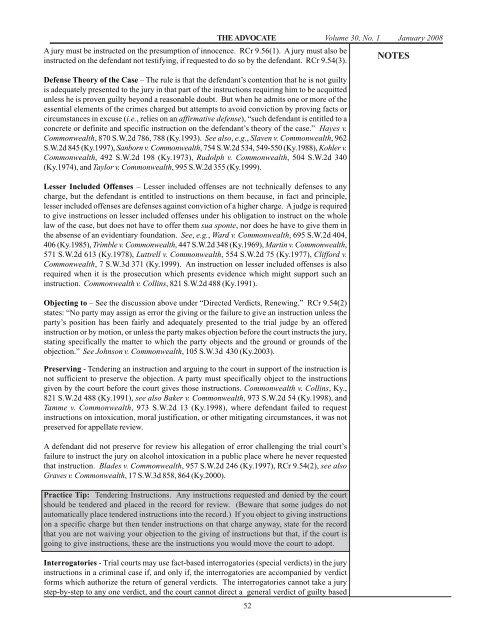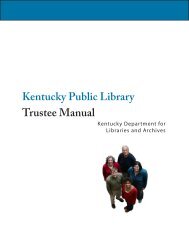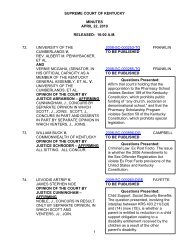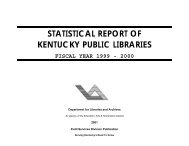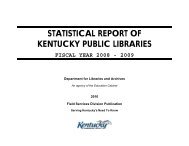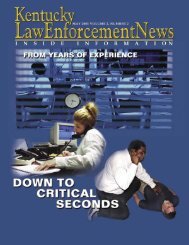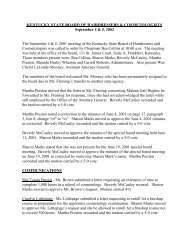Jan08 Advo.pmd - e-archives Home
Jan08 Advo.pmd - e-archives Home
Jan08 Advo.pmd - e-archives Home
You also want an ePaper? Increase the reach of your titles
YUMPU automatically turns print PDFs into web optimized ePapers that Google loves.
THE ADVOCATE Volume 30, No. 1 January 2008<br />
A jury must be instructed on the presumption of innocence. RCr 9.56(1). A jury must also be<br />
instructed on the defendant not testifying, if requested to do so by the defendant. RCr 9.54(3).<br />
Defense Theory of the Case – The rule is that the defendant’s contention that he is not guilty<br />
is adequately presented to the jury in that part of the instructions requiring him to be acquitted<br />
unless he is proven guilty beyond a reasonable doubt. But when he admits one or more of the<br />
essential elements of the crimes charged but attempts to avoid conviction by proving facts or<br />
circumstances in excuse (i.e., relies on an affirmative defense), “such defendant is entitled to a<br />
concrete or definite and specific instruction on the defendant’s theory of the case.” Hayes v.<br />
Commonwealth, 870 S.W.2d 786, 788 (Ky.1993). See also, e.g., Slaven v. Commonwealth, 962<br />
S.W.2d 845 (Ky.1997), Sanborn v. Commonwealth, 754 S.W.2d 534, 549-550 (Ky.1988), Kohler v.<br />
Commonwealth, 492 S.W.2d 198 (Ky.1973), Rudolph v. Commonwealth, 504 S.W.2d 340<br />
(Ky.1974), and Taylor v. Commonwealth, 995 S.W.2d 355 (Ky.1999).<br />
Lesser Included Offenses – Lesser included offenses are not technically defenses to any<br />
charge, but the defendant is entitled to instructions on them because, in fact and principle,<br />
lesser included offenses are defenses against conviction of a higher charge. A judge is required<br />
to give instructions on lesser included offenses under his obligation to instruct on the whole<br />
law of the case, but does not have to offer them sua sponte, nor does he have to give them in<br />
the absense of an evidentiary foundation. See, e.g., Ward v. Commonwealth, 695 S.W.2d 404,<br />
406 (Ky.1985), Trimble v. Commonwealth, 447 S.W.2d 348 (Ky.1969), Martin v. Commonwealth,<br />
571 S.W.2d 613 (Ky.1978), Luttrell v. Commonwealth, 554 S.W.2d 75 (Ky.1977), Clifford v.<br />
Commonwealth, 7 S.W.3d 371 (Ky.1999). An instruction on lesser included offenses is also<br />
required when it is the prosecution which presents evidence which might support such an<br />
instruction. Commonwealth v. Collins, 821 S.W.2d 488 (Ky.1991).<br />
Objecting to – See the discussion above under “Directed Verdicts, Renewing.” RCr 9.54(2)<br />
states: “No party may assign as error the giving or the failure to give an instruction unless the<br />
party’s position has been fairly and adequately presented to the trial judge by an offered<br />
instruction or by motion, or unless the party makes objection before the court instructs the jury,<br />
stating specifically the matter to which the party objects and the ground or grounds of the<br />
objection.” See Johnson v. Commonwealth, 105 S.W.3d 430 (Ky.2003).<br />
Preserving - Tendering an instruction and arguing to the court in support of the instruction is<br />
not sufficient to preserve the objection. A party must specifically object to the instructions<br />
given by the court before the court gives those instructions. Commonwealth v. Collins, Ky.,<br />
821 S.W.2d 488 (Ky.1991), see also Baker v. Commonwealth, 973 S.W.2d 54 (Ky.1998), and<br />
Tamme v. Commonwealth, 973 S.W.2d 13 (Ky.1998), where defendant failed to request<br />
instructions on intoxication, moral justification, or other mitigating circumstances, it was not<br />
preserved for appellate review.<br />
A defendant did not preserve for review his allegation of error challenging the trial court’s<br />
failure to instruct the jury on alcohol intoxication in a public place where he never requested<br />
that instruction. Blades v. Commonwealth, 957 S.W.2d 246 (Ky.1997), RCr 9.54(2), see also<br />
Graves v. Commonwealth, 17 S.W.3d 858, 864 (Ky.2000).<br />
Practice Tip: Tendering Instructions. Any instructions requested and denied by the court<br />
should be tendered and placed in the record for review. (Beware that some judges do not<br />
automatically place tendered instructions into the record.) If you object to giving instructions<br />
on a specific charge but then tender instructions on that charge anyway, state for the record<br />
that you are not waiving your objection to the giving of instructions but that, if the court is<br />
going to give instructions, these are the instructions you would move the court to adopt.<br />
Interrogatories - Trial courts may use fact-based interrogatories (special verdicts) in the jury<br />
instructions in a criminal case if, and only if, the interrogatories are accompanied by verdict<br />
forms which authorize the return of general verdicts. The interrogatories cannot take a jury<br />
step-by-step to any one verdict, and the court cannot direct a general verdict of guilty based<br />
52<br />
NOTES


